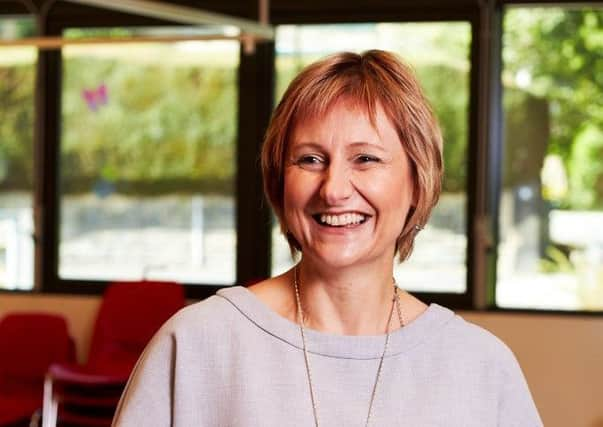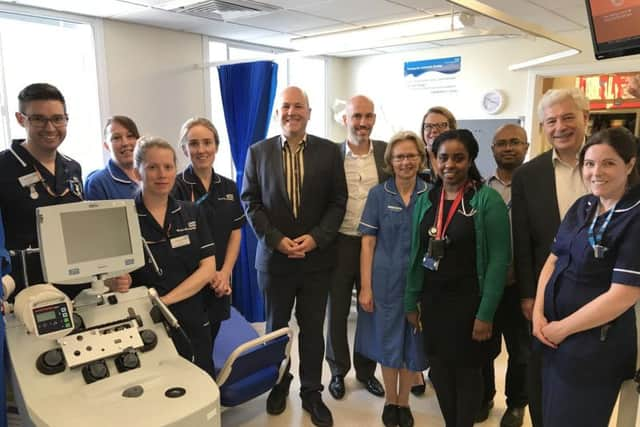‘How pioneering stem cell treatment for MS saved my life.”


Three years ago Louise Willetts’s MS had become extremely severe. She was in a wheelchair and had given up on her family and career ambitions.
But since having a stem cell transplant at Sheffield Teaching Hospitals Louise has gone on to have a healthy baby daughter called Joy.
Advertisement
Hide AdAdvertisement
Hide Ad“The team’s work has made such a difference to all areas of my life. It has allowed me to fulfil my dreams including having had a baby, which I thought I wouldn’t be able to do again. I am now using my experiences of MS to train as a counsellor to support other people who have been diagnosed. I would like to say a huge thank you to both professors and their teams for making all of this possible.”


Another person to benefit from the pioneering treatment is Colette Beecher.
Colette, 50, from Wickersley, Rotherham, was diagnosed with MS in January 2011, and has been relapse free for three years after having the MS stem cell transplantation at Sheffield’s Royal Hallamshire Hospital in April 2016.
“Several of my symptoms have now disappeared – I no longer get spasms that go down my spine when I flex my head forward, and my right leg hasn’t given way for three years.”
Advertisement
Hide AdAdvertisement
Hide AdA recent MRI scan showed she had no signs of the active disease and clinically she has had no further relapses since receiving this treatment.
“I now have the possibility of living a life without MS and contemplating a future without disability. This is a future that this treatment has given me. I’d like to thank Professor Sharrack and Professor Snowden and the team for seeking ways to treat this condition so that people like me can live a life not defined by MS and disability but with possibilities, freedom and optimism.”
The breakthrough MS treatment has seen Sheffield Teaching Hospitals NHS Foundation Trust named as overall national winner of the NHS Future Award at the NHS Parliamentary Awards at the House of Commons. The award was given to the team of specialists who pioneered the treatment in the UK which is the first to significantly reverse disability in certain patients with multiple sclerosis. The treatment called autologous haematopoietic stem cell transplantation (AHSCT) and the Sheffield team led by Professor Basil Sharrack, consultant neurologist and Professor John Snowden, consultant haematologist was nominated by Clive Betts MP and was selected from 750 nominations submitted by over 230 MPs across the country.
The global impact of this treatment on patients with severe inflammatory MS has been confirmed by the published findings of the first randomised controlled trial in this field, the MIST trial, which showed that AHSCT stabilised the disease and reduced the level of disability to levels never previously seen before in research trials investigating new and emerging treatments for MS. Sheffield Teaching Hospitals NHS Foundation Trust was the sole UK site involved in the trial.
Advertisement
Hide AdAdvertisement
Hide AdAHSCT aims to stop the damage caused by MS to the brain and spinal cord by ‘wiping out’ the faulty immune system causing the illness with a high dose of chemotherapy. Once destroyed, the immune system is then rebuilt using blood and bone marrow stem cells which would have been collected from the patient’s own blood prior to chemotherapy.
The regenerating immune system is then effectively ‘rebooted’. It is this mechanism that allows the inflammation in the brain and spinal cord that causes problems with vision, mobility, sensation, balance, bladder, cognition, fatigue and pain, to subside and heal.
So far the treatment has had a life-changing impact on patients who have the relapsing remitting form of the disease, and many regaining their ability to walk, run and even dance as a result.
Kirsten Major, chief executive for Sheffield Teaching Hospitals NHS Foundation, said: “We are thrilled that the team have won this highly coveted national award. We have a proud tradition of pioneering the latest innovations and advances in medical treatments in partnership with our University, health and industry colleagues.
Advertisement
Hide AdAdvertisement
Hide Ad“The AHSCT team, led by Professor Sharrack and Professor Snowden, have played a leading role nationally and globally in developing this treatment which has the potential to benefit many thousands of MS sufferers around the world. We are incredibly proud of everyone who has contributed to the development and delivery of this exciting new treatment.”